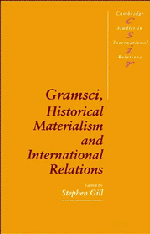Gramsci and global politics: towards a post-hegemonic research agenda
Published online by Cambridge University Press: 10 January 2011
Summary
This book introduces selected new developments in historical materialism. Its central argument is that we need to develop new approaches to international political economy (IPE) and international relations (IR) through the elaboration of historically integrated, dialectical forms of explanation, appropriate to the conditions of the late twentieth century. In this introduction I sketch some of the main ideas, issues and research questions which relate broadly speaking to the reconstruction of historical materialist theories of IR. The contributions to this book offer a range of different approaches within a broadly shared perspective. An anonymous reviewer called the perspective which informs most of the contributions the ‘new Italian school’ of IR. In chapter 1, I use the epithet ‘Italian’ with some irony, hesitation and deference to our two Italian contributors (Giovanni Arrighi and Enrico Augelli).
As will become apparent, the essays here are inspired by the problems raised not only in Antonio Gramsci's writings but also those of other authors, such as Karl Marx, Fernand Braudel, Karl Polanyi, Robert Cox, and others, for example, working in the Amsterdam School of International Relations (see the chapters by Otto Holman and Kees van de Pijl). In other words, Gramsci's notes on IR need to be linked to a reconstruction of historical materialist thought in a broad sense, so as to avoid a new intellectual sectarianism.
- Type
- Chapter
- Information
- Publisher: Cambridge University PressPrint publication year: 1993
- 16
- Cited by



